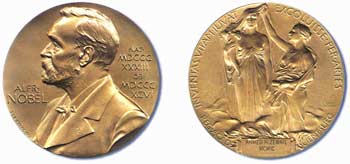Ahmed Zewail
Banquet speech
Ahmed H. Zewail’s speech at the Nobel Banquet, 10 December 1999.
Your Majesties, Excellencies, Ladies and Gentlemen,
Let me begin with a reflection on a personal story, that of a voyage through time. The medal I received from his Majesty this evening was designed by Erik Lindberg in 1902 to represent Nature in the form of the Goddess Isis – or eesis – the Egyptian Goddess of Motherhood. She emerges from the clouds, holding a cornucopia in her arms and the veil which covers her cold and austere face is held up by the Genius of Science1. Indeed, it is the genius of science which pushed forward the race against time, from the beginning of astronomical calendars six millennia ago in the land of Isis to the femtosecond regime honored tonight for the ultimate achievement in the microcosmos. I began life and education in the same Land of Isis, Egypt, made the scientific unveiling in America, and tonight, I receive this honor in Sweden, with a Nobel Medal which takes me right back to the beginning. This internationalization by the Genius of Science is precisely what Mr. Nobel wished for more than a century ago.
In visionary words, Mr. Nobel summed up the purpose of the Prize: “The conquests of scientific research and its ever expanding field awake in us the hope that microbes – of the soul as well as of the body – will gradually be exterminated and that the only war humanity will wage in future will be war against these microbes”. Mr. Nobel saw clearly what he wished for the world and the value of scientific discovery and advancement. Although there exist in the world today some microbes of the soul, such as discrimination and aggression, science was and still is the core of progress for humanity and the continuity of civilization. From the dawn of history, science has probed the universe of unknowns, searching for the uniting laws of nature. The world applauds your Majesties and the Swedish people for your appreciation, recognition, and celebration of discoveries of the unknown, which, according to Alfred Nobel will “leave the greatest benefit to mankind”. I know of no other country that celebrates intellectual achievements with this class and passion.
To the world, the Nobel Prize has become the crowning honor for two reasons. For scientists, it recognizes their untiring efforts which lead to new fields of discovery, and places them in the annals of history with other notable scientists. For Science, the Prize inspires the people of the world about the importance and value of new discoveries, and in so doing science becomes better appreciated and supported by the public, and, hopefully, by governments. Both of these are noble causes and we thank you. To me, there is a third cause as well.
If the Nobel Prize had existed 6,000 years ago, when Egypt’s civilization began, or even 2,000 years ago, when the famous library and university (museum) at Alexandria were established, Egypt would have scored very highly in many fields. In recent times, however, Egypt and the Arab World, which gave to Science Ibn-Sina (Avicenna), Ibn-Rushd (Averroës), Ibn-Hayan (Geber), Ibn-Haytham (Al Hazen), and others, have had no Prizes in science or medicine. I sincerely hope that this first one will inspire the young generations of developing countries with the knowledge that it is possible to contribute to world science and technology. As expressed eloquently in 1825 by Sir Humphrey Davy: “Fortunately, science, like that nature to which it belongs, is neither limited by time nor by space. It belongs to the world, and is of no country and of no age.” There is a whole world outside the boundaries of the “West” and the “North” and we can all help to make it the microbe-free world of Mr. Nobel. I also hope that the Prize will help the region I came from to focus on the advancement of science, the Science Society, and on dignity and peace for humanity.
Your Majesties, I do not know how to express my own personal feelings and those of my family about this recognition. Behind this recognition, there exists a larger community of femtoscientists all over the world who tonight declare themselves proud. My own science family at Caltech of close to 150 young scientists represents the true army that marched to victory and made the contribution possible; they, too, must be proud of their effort. Personally, I have been enriched by my experiences in Egypt and America, and feel fortunate to have been endowed with a true passion for knowledge. I am grateful that this highest crowning honor comes at a young age when I can, hopefully, enjoy and witness its impact on science and humanity. The honor comes with great responsibilities and new challenges for the future, and I do hope to be able to continue the mission, recalling the thoughtful words of the great scholar, Dr. Taha Hussein:
![]()
which can be paraphrased in the following words: “The end will begin when seekers of knowledge become satisfied with their own achievements.”
Thank you, Your Majesties. Thank you, all who are celebrating science and scientists.

1. The inscription reads: Inventas vitam juvat excoluisse per artes, loosely translated: “And they who bettered life on earth by new found mastery” (literally stated, “inventions enhance life which is beautified through art”).
Nobel Prizes and laureates
Six prizes were awarded for achievements that have conferred the greatest benefit to humankind. The 14 laureates' work and discoveries range from quantum tunnelling to promoting democratic rights.
See them all presented here.
